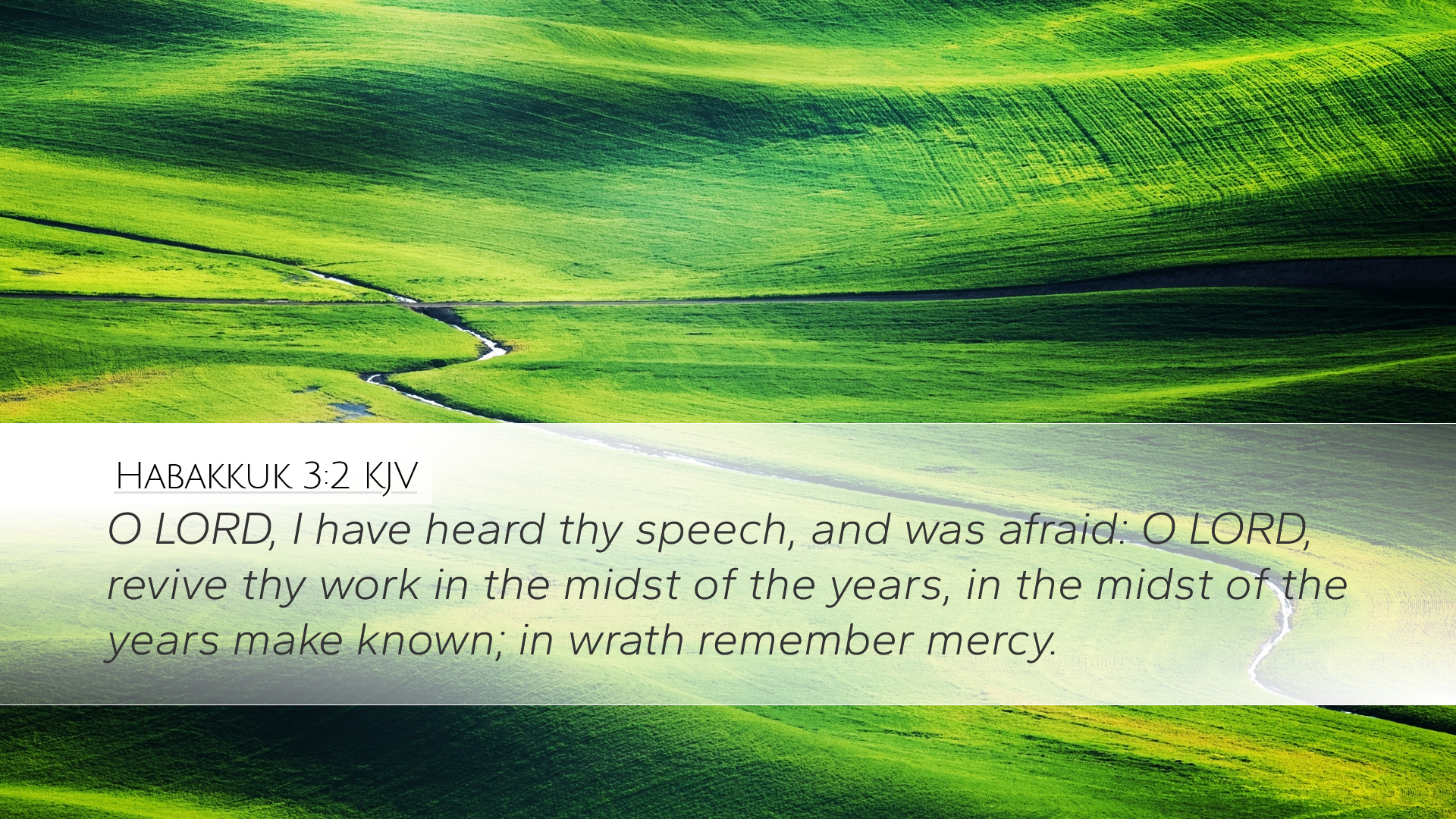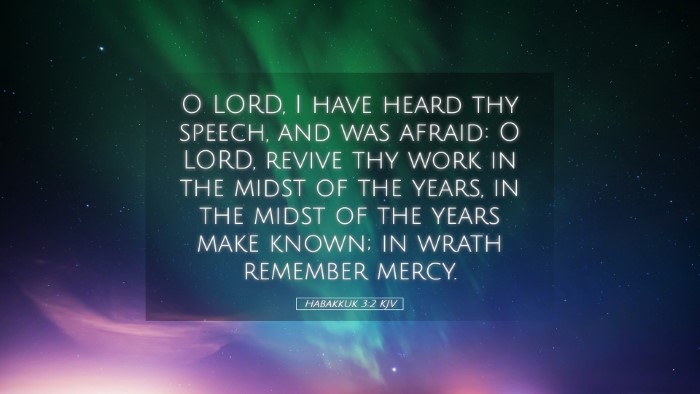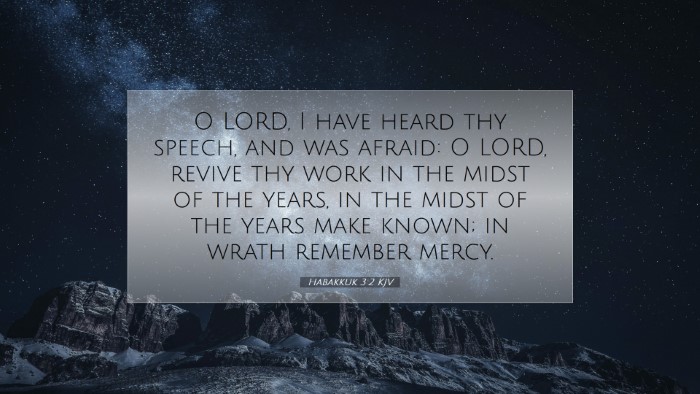Old Testament
Genesis Exodus Leviticus Numbers Deuteronomy Joshua Judges Ruth 1 Samuel 2 Samuel 1 Kings 2 Kings 1 Chronicles 2 Chronicles Ezra Nehemiah Esther Job Psalms Proverbs Ecclesiastes Song of Solomon Isaiah Jeremiah Lamentations Ezekiel Daniel Hosea Joel Amos Obadiah Jonah Micah Nahum Habakkuk Zephaniah Haggai Zechariah MalachiHabakkuk 3:2
Habakkuk 3:2 KJV
O LORD, I have heard thy speech, and was afraid: O LORD, revive thy work in the midst of the years, in the midst of the years make known; in wrath remember mercy.
Habakkuk 3:2 Bible Commentary
Habakkuk 3:2: "O Lord, I have heard thy speech, and was afraid: O Lord, revive thy work in the midst of the years, in the midst of the years make known; in wrath remember mercy."
Introduction
The prophetic book of Habakkuk is situated within the framework of Israel's tumultuous history, where the prophet grapples with God's justice and mercy amidst suffering. Habakkuk 3:2 stands as a poignant prayer, embodying both reverence and supplication. The following commentary integrates insights from public domain scholars, elucidating the verse's theological and practical implications for contemporary readers, especially pastors, theologians, and students of the Word.
Historical Context
Habakkuk prophesied during a period of impending Babylonian invasion, capturing the nation’s anxiety and the prophet’s questioning of God's plans. This context is vital for understanding the intensity of Habakkuk’s prayer in 3:2. The verse reflects a profound transformation from despair to hopeful anticipation.
- Historical Setting: Habakkuk's concerns are rooted in the moral decay and violence within Judah, prompting him to seek divine revelations regarding God's plan for His people.
- The Babylonian Threat: The Assyrian and Babylonian empires posed existential threats, leading to questions surrounding divine justice and mercy.
Verse Analysis
This verse unfolds in three key parts that illustrate the prophet's journey from fear to faith:
- Hearing the Speech of the Lord:
The phrase "I have heard thy speech" indicates a personal encounter with God’s revelation. Matthew Henry notes that this hearing is not merely auditory but engaged; it transforms the prophet's outlook and ignites a sense of reverence. - Fear and Reverence:
“And was afraid” reflects the profound weight of God’s message. Albert Barnes argues that genuine encounters with God provoke awe and introspection, leading to a deeper understanding of divine holiness. - The Plea for Revitalization:
"Revive thy work in the midst of the years" emphasizes the urgency of renewal amidst historical decline. Adam Clarke interprets this as a cry for God to act once again in strength, suggesting that spiritual revitalization is necessary for communal restoration.
Thematic Insights
Three central themes emerge from this verse that resonate with the broader biblical narrative:
- Divine Sovereignty:
Habakkuk acknowledges God’s ultimate authority over history, suggesting a deep trust in God's governance despite prevailing chaos. - Mercy in Judgment:
The concluding plea, "in wrath remember mercy," juxtaposes God’s justice with His compassion. This theme is echoed throughout Scripture; the tension between divine judgment and mercy invites theological reflection on humanity’s need for grace. - Hope and Anticipation:
The plea for revival infuses the narrative with hope. It challenges contemporary readers to seek God actively, trusting in His providential care and restorative power.
Practical Applications
This verse is not only foundational for understanding the prophetic literature but also serves as a rich source for personal reflection and ecclesiastical practice:
- Incorporating Prayer in Worship:
Pastors can utilize the structure of Habakkuk's prayer as a template for congregational prayers, fostering a culture of reverence and expectation during worship. - Encouraging Spiritual Renewal:
This verse serves as a profound reminder of the need for spiritual awakening both personally and corporately. Community discussions or teachings focused on seeking God for revitalization can be instrumental. - Theological Dialogue on Justice and Mercy:
Engaging with the themes of this passage can lead to fruitful discussions on the balance between justice and mercy in today’s societal context.
Conclusion
Habakkuk 3:2 encapsulates a weighty request for God’s intervention, blending fear, hope, and a longing for divine renewal. The insights derived from public domain commentaries provide a layered understanding that serves pastors, theologians, and scholars well. Through a lens of both reverence and expectation, this verse encourages a deeper relationship with God, urging believers to seek His presence and interventions in their lives and communities.


